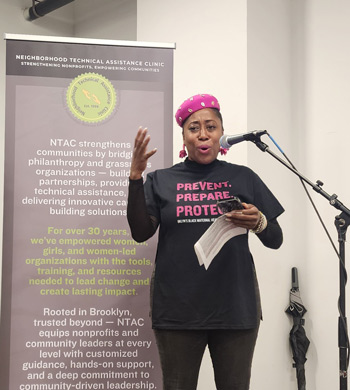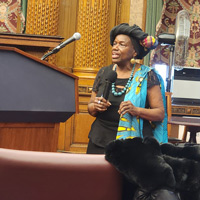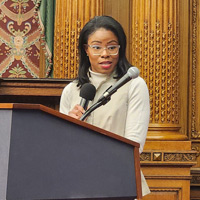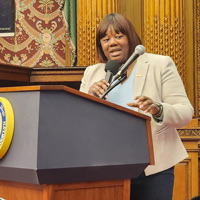by Yvette Moore
Brooklyn had its first “Black Maternal Health Awareness Walk,” April 11, with participants walking downtown from Borough Hall to Abolitionist Place and City Point at Albee Square to kick off a weeklong focus on the issue.
The event gathered a powerful collective of medical experts, community service providers, advocates, birthing practitioners and women and men who had experienced the often-subpar care behind the troubling statistics on Black maternal health.
Walk organizers said more than 1-in-5 Black mothers hospitalized for childbirth report experiencing poor treatment based on their race, ethnicity, cultural background, or language. The Black maternal mortality (50.3/100,000 live births) is more than three times the rate for White women (14.5), and significantly higher than Hispanic women (12.4) and Asian women (10.7), according to Maternal Mortality data released by the Center for Disease Control, from the National Vital Statistics System.
“We are walking in honor of the thousands of Black women who have endured, survived and continue to fight against maternal health disparities every single day,” said The Rev. Dr. Valerie Oliver-Durrah, founder and CEO of Neighborhood Technical Assistance Clinic and co-organizer of the event with Brooke Remel Oliver-Durrah, her daughter. “This is more than a walk. It is a witness. It’s a movement. This is history in motion.”
Rev. Oliver-Durrah said support from community partners including Brooklyn Collaborative, Downtown Brooklyn Partnerships, City Point were critical in organizing the event.
The Walk began inside Borough Hall with morning presentations on the state of Black maternal health care and ended with an afternoon “resource activation zone” where community-based maternal care providers and advocates shared resources with participants inside City Point.
Afternoon speakers included Dr. Denise Howard, Chief of Obstetrics and Gynecology at New York-Presbyterian Methodist Hospital, and Jose Perez, who lost his fiancé Christine Fields shortly after she gave birth because of botched medical care at Woodhull Hospital.
The morning information session opened in celebration with stilt walkers, a violin soloist and a prayer by The Rev. Karen Smith Daughtry of the House of the Lord Pentecostal Church for the “maternal health care deserts” too often experienced by Black women.
While the morning presenters spoke as professionals in their respective areas, many also shared their own experiences of receiving inadequate maternal health care. New York State Assemblywoman Rodneyse Bichotte Hermelyn of Brooklyn’s 42nd District was one of these.
In 2016 she experienced a problem while carrying twins and went to Columbia University Hospital for care. She was turned away for insurance reasons, and because they didn’t want to be liable. Later, she was rushed to another facility.
“We are walking in honor of the thousands of Black women who have endured, survived and continue to fight against maternal health disparities every single day. This is more than a walk. It is a witness. It’s a movement. This is history in motion.”
-The Rev. Dr. Valerie Oliver-Durrah
founder and CEO of Neighborhood Technical Assistance Clinic
“Unfortunately, my son Jonah didn’t make it,” she said. “For a long time, I lived with this pain. I didn’t go to therapy. But I thought about an opportunity to help other people, other mothers. And that my voice needed to be loud. I didn’t want my late son to have died in vain. So, we wrote a bill that took four years to write, the Jonah Bichotte Cowan law, which mandates hospitals to take care of women, any woman, undergoing pre-term risks. You can’t turn them away. And it was hard passing that bill. In 2020 it finally passed.”
Assemblywoman Hermelyn said United States has the third highest maternal mortality rate of high-income nations.

Our Time Press applauds in this issue the work of Dr. Valerie Oliver-Durrah Brooke Durrah (above) and community partners in building a Brooklyn milestone: the first-ever Brooklyn Black Maternal Health Awareness Walk with its mission to Prevent, Prepare, Protect and, ultimately, empower and inspire the forgotten, ignored or overlooked.
The Durrah women, mother and daughter, are co-organizers and producers of the event.
“When Black women say, ‘I’m in pain,’ they have to listen,” she said.
Camille A. Emeagwali, Senior Vice President of Programs & Strategic Learning for New York Women’s Foundation, was another morning speaker who had experienced a high-risk pregnancy. She focused on the importance of listening to Black women and supporting their responses to the Black maternal health care crisis.
“Since the inception of the New York Women’s Foundation 38 years ago we have prioritized funding for reproductive justice and health equity, especially for Black women, whose problems and challenges are often ignored and the solutions for those problems and challenges are often under invested in,” Ms. Emeagwali said. “We need to recognize that being a Black pregnant woman should not be a health crisis.”
She noted the recent closure of local medical facilities providing culturally competent sexual and reproductive health to people of Bedford Stuyvesant, Brownsville, Crown Heights, East New York, Flatbush, and Fort Greene-areas that are already underserved.
“Nearly 3 out of 4 pregnancy-related deaths are preventable,” she said. “We can no longer ignore that many of the health disparities stem from structural racism, such as residential segregation, community disinvestment, income inequality, lack of healthy food access and affordability.
“We can no longer ignore that racial inequities in maternal health often persist regardless of education or income. This points to systemic issues beyond social-economic status.”
Black women experience implicit bias and discrimination, barriers to receiving preventative prenatal and post partem care, overuse of cesarean deliveries, and providers who fail to address serious complications in their pregnancies, she said.
“We must fund Black women who are advocating, organizing, holding the hand of a pregnant women providing support.”
-Camille A. Emeagwali
Senior Vice President of Programs & Strategic Learning
New York Women’s Foundation
Ms. Emeagwali challenged the audience to imagine radically different health care experiences for pregnant Black women, including routinely having access to quality health care before, during and after deliveries. She pointed to the need for Black pregnant women to have access to doulas and midwives and for health care providers to trust Black women, listen to them, and collect data centered on the experience of Black people to combat systemic racism.
“And we must fund Black women who are advocating, organizing, holding the hand of a pregnant women providing support,” she said.
Ms. Emeagwali said less than 2 percent of all U.S. funding goes to women and girl charities, including those focused on maternal health and reproduce justice.
Dr. Thomasina Ellison Clarke, an OB-GYN at Maimonides Medical Center and mother of two talked about the implicit bias in Black maternal health care. She heralded the role midwives could play in turning that around.
“Historically, Black women have faced systemic barriers that have impacted their health outcomes,” she said. “From the days of slavery to segregation, and even in today’s health system, Black mothers have often been denied the care and respect they are entitled to.
“So, here’s a good chance to shout out Black midwives! Despite systemic barriers, Black midwives have been critical in supporting Black women throughout history.
“They have offered culturally competent, patient-centered care, advocated for their patients, and ensured safe deliveries. As hidden figures and unsung heroes, it is central to acknowledge their contributions and continue to support their work by duplicating their best practices.”
Black women confronted with complications are 3 to 4 times more likely to die from pregnancy-related issues than White women, Dr. Clarke said. Yet Black mothers often report feeling unheard and dismissed by health care providers when they tell them what they are experiencing.
“When Black women say, ‘I’m in pain,’ they have to listen.”
-Assemblywoman Rodneyse Bichotte Hermelyn
Brooklyn’s 42nd District
“This lack of respect and understanding can lead to inadequate care and poor health outcomes,” she said.
Dr. Clarke said acknowledging disparities is not enough, but rather, implicit bias must be addressed through education and ongoing training and cultural exposure. Tackling these disparities will require new and ongoing policy initiatives on both the state and federal levels, she said. Health care providers and mothers themselves must have a seat at the table as these policy initiatives are developed and reviewed, she said.
Community support is vital for improving Black maternal health outcomes, she said, including peer support, doula services, and the much needed culturally competent, patient-centered care are essential resources to Black mothers in marginalized communities.
Dr. Clarke urged participants to reach out to their local politicians and express their concerns about Black maternal health care.
“Then you take the knowledge you have acquired through what you have seen and heard to the poll and vote. This is your voice and call to action,” she said.
Ngozi Moses, founding Executive Director of Brooklyn Perinatal Network, focused on equity in Black maternal health care. Since 1988 when the network started from a community task force to address high infant mortality, its purpose has been to prevent and reduce infant/maternal illness and death by providing needed information and services through its collaborative of community partners. But over the years, Ms. Moses has consistently experienced the under-funding of community-based organizations providing such vital services.
Ms. Moses, a petite woman under 5 feet, took the microphone off the raised podium to speak about about equity in maternal health care.
“Many of us confuse equity and inequality. So, I want to do a simple demonstration to show when you think of equity and equality, what you need to be thinking of.
“If all of us were to speak from this mic,” she said, pointing to the raised mic stand on the podium, “some of us would reach it, and some, like me, would not. For me to reach that mike, I’d need a soapbox to stand on.
“That soapbox is what we need in our community. We need committed investment where there is disinvestment.”
Community-based organizations are the bloodline of the community and are key to good maternal health care for Black women because they have, “boots on the ground to help families who need help,” Ms. Moses said.
“But inequity is a big problem because the money and payment for the value of our service is never recognized by those who have the power to change the paradigm and value our services and pay us more,” she said. “We don’t get the credit, and we don’t want the credit. We want the funding.”
Kimberly Seals Allers, a journalist, public speaker, and techy introduced a new way to use technology to improve maternal care outcomes for Black women with her Irth App.
Irth is Birth, minus the B, representing the word bias, or Birth Without Bias, as Ms. Allers said. Irth is a platform much like Yelp, which people use to find good restaurants and other services.
“How many of y’all are going to 2-star restaurants and hotels on purpose? No, you are not,” she said. “Irth is the first app designed for Black and Brown women and birthing people to find and leave reviews of OB-GYNs, birthing hospitals, and pediatricians. We are all about publicly sharing where we’re getting good care and where we are not. We can create safety for each other while driving more accountability and transparency.”
Ms. Allers said the app uses the reviews to build a database measuring health care providers and institutions from a patient’s perspective.
“On the backend, we turn these reviews into data. Yes, we need our own data. We cannot rely on these systems to give us data. And we can’t just rely on clinical measures. Just because we didn’t die or nearly die doesn’t mean we had the experience that we deserve. That’s a very low bar,” Ms. Allers said.
The Irth App launched on the Apple and Google Play stores in 2020. The app also allows family members, midwives, and doulas to search and leave reviews of their OB-GYN, birthing hospitals, postpartum care and pediatricians, up to the baby’s first year.
Ms. Allers’ company can also use its data to guide medical facilities through a quality improvement process rooted in Black and Brown patient experience and voices.
The company is currently working with Brookdale Hospital.
At City Point, Walk co-organizer Brooke Remel Oliver-Durrah summed up the day and a charge from the event’s rally cry, “To Prepare, to Prevent, and to Protect.”
“Those are simple and powerful words,” she said. “To prevent the injustice of unnecessary bias and loss, to prepare our communities with knowledge and resources for equitable care, and to protect mothers, Black babies, Black futures.”
Ms. Oliver-Durrah pointed out the significance of Brooklyn’s first Black Women’s Maternal Health Awareness Walk ending at City Point, just across the street from Abolitionist Place. The historic stretch of Duffield was once home to Harriett Tubman and believed to have sheltered those escaping slavery as part of the Underground Railroad.
“We stand on sacred ground where Black people fought for their freedom just as we are now fighting for our health justice, for equity care, and for the protection of Black life at every stage,” she said.
Yvette Moore is the author of Freedom Songs and its sequel Just Sketching, both are available on Amazon.com
Telling Their Stories


Crystal Cranmoore,WABC-TV Reporter and morning program moderator, Maternal Health Awareness Walk

Kimberly Council, Brooklyn Deputy Borough President


